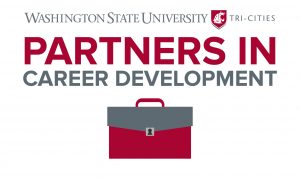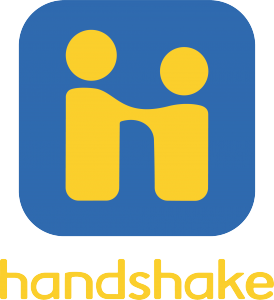Employer Services and Internships
Career services is dedicated to creating connections between employers and students to develop professional preparedness, internships, networking, and career employment. We offer employers many avenues – from posting a job to promoting internship programs – to engage students and tap into a pipeline of future talent.
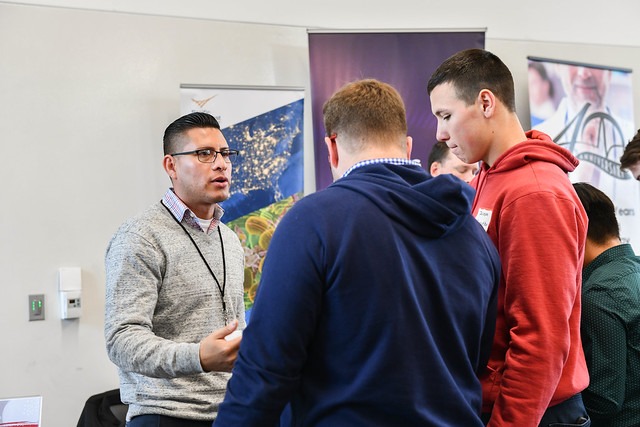
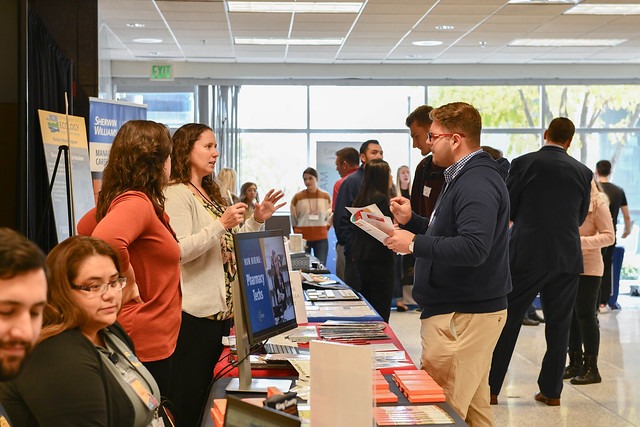
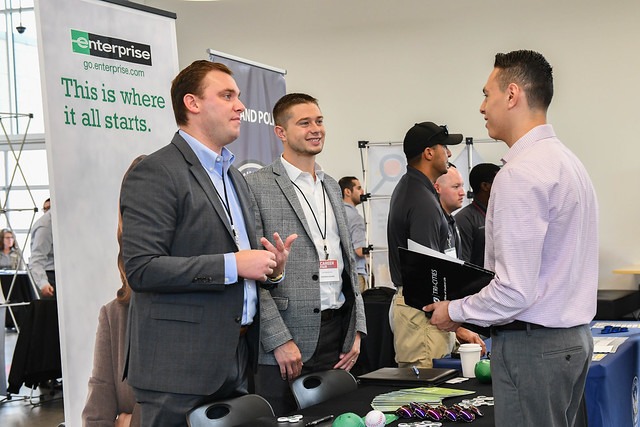
Partners in Career Development
Connecting Students with Industry Leaders
WSU Tri-Cities’ Career Services facilitates meaningful relationships between industry leaders and our students through an innovative program called Partners in Career Development. We are looking for professionals in the community to partner with career services to give professional and career advice and share skills with students who are interested in specific fields.
Professional volunteers can choose their commitment level and meet with students just one time or on a reoccurring basis. Students benefit immensely from learning about current trends in the workplace directly from you, the expert, and effective ways to land a job in your career field. As someone who is currently or has experience in the field, we look forward to you being able to share your advice and experience to the areas future workforce.
How can you help?
Prepare Cougs for Careers
- Resumes
- Cover Letters
- Interview Prep
- Internship Search
Advise Cougs on Career Opportunities
- Job Searching
- Current Market Trends
- Mentoring
- Networking
Please NOTE: This is Not Legal Advice
The information on this page is not legal advice – it is provided for informational purposes only. Please consult with your legal counsel regarding wage issues for your specific internship positions, compliance with Labor Laws, and issues of fair wages.
Employer Internship and Job Posting FAQ
Post a Job or Internship
Job posting on the WSU Tri-Cities campus is easy and FREE.
Handshake is Washington State University’s free online employment resource for students, alumni, and employers. Handshake is a digital platform that connects students and alumni to professional full-time, part-time, internship, and on-campus employment opportunities. To start posting your opportunities, please visit Handshake and create a free profile today! If you have any further questions or specific hiring needs, please contact the office at tricities.careers@wsu.edu
Please note:
- All jobs and internships submitted will be reviewed; only those compliant with the WSU Tri-Cities Recruiting and Job Posting Policies and Procedures will be considered.
- We do not select or interview for positions and can only recommend students to apply for positions.
- We do not accept attachments as we cannot upload them to our site.
Be sure you include the following information in the post: Employer Name, Location, Job Type: (full-time, part-time, internship), Time Length: (permanent, temporary, Summer only), Compensation, Job Description, Qualifications, To Apply, Closing Date.
What are the benefits of hiring Interns?
- Cost Effectiveness — Interns cost less per man-hour than your full-time employees, especially when you factor in benefits. Hiring interns to take on appropriate tasks makes positive economic sense.
- Pipeline of Future Employees — Internships are a great way to build up a ready pool of tried and trained future employees. In addition, interns who have a positive experience talk to their classmates who might be encouraged to apply to your company.
- Complete Priority C Projects/Tasks — Internships can be a cost effective way to tackle those pesky back-burner projects that require less expertise but lots of time and energy.
- Give Back to Your Community and University — Hiring interns is a responsible and valuable way to invest in local students, your local University, and your community. Companies that have an active intern program are positively perceived by others within and outside the company.
- Infuse New Ideas and Excitement — Benefit from the cutting edge technology and applications learned in the classroom setting that students bring to your company. Students often bring fresh perspectives or enthusiasm that can ignite the same in your employees.
How do start an Internship Program?
- Start with role or project you want assigned to the intern. The best program gives the intern substantive work that is related to his major, is within his capabilities, but that grows his skill set and knowledge base. If routine busy work is part of the intern’s role, be sure there is enough substantive work to make the internship a true learning experience. Establish a list of deliverables and outcomes for the intern.
- Set the timeline for the internship program including promotion, posting time, time for resume processing, hiring and onboarding, start date, end date, and dates for special events/deliverables.
- Decide on the intern qualifications you desire. Think more in terms of foundational skills, like communication, leadership, organization, and teamwork, than technical skills or the experience you may not find in college students.
- Decide on what you will pay the intern. You may want to find out what other firms pay interns of the same caliber to do the work your firm is asking be done.
- Post your internship opportunity with all the normal routes you use to market for new hires. Give specific attention to sending the post to the colleges and universities from which you want to recruit. If you have a short reach or want to work exclusively with a particular school, make sure you work closely with their career development staff.
When is the best time to look for an intern?
Many companies start their intern search process in the Fall by attending career fairs and generating interest. As a general rule, the broader your search and the more interns you are looking to hire, the earlier you want to begin the process.
Below are some general timelines depending on whether your company wants to begin early or later in the year.
| Task | Early | Mid‑range | Later |
| Recruit/Take Résumés | Sept–Jan | Jan–Mar | Mar-Apr |
| Interview/Hire | Feb-Mar | Mar-Apr | Apr-May |
| Work Start | May-June | May-June | May-June |
The early timeline has the advantage of a deeper pool of students from which to recruit, time to reach more campuses, time to attend career events, and a non-rushed hiring process. However, good candidates are looking for positions right up until they leave the campus for the summer. Students are also looking for internships year around. Generally internships happen during the typical university semesters: January-May, May-August, and August-December.
What roles and responsibilities should an intern have?
Internships have two areas of great opportunity: what can the intern do for you and what can you teach the intern. Think in terms of these two areas when deciding what tasks to give interns.
In the “what-the-intern-can-do-for-us” category, interns are great at getting back-burner projects done. Some intern projects can be updating a policy or procedure manual, inventory counts, creating an inventory system, market research, or maybe help a professional on your staff. Ask your staff what they would have an intern do if one was available.
As far as “what-can-we-teach-the-intern” category, consider all the different work settings, projects, and processes that would benefit an intern to experience. Seeing different work sites within your company, sitting in on significant meetings, making a presentation to senior management, or having a day of exploration within each department of your company could be a fantastic learning experience for the intern.
Routine busy work—filing, data entry, “gophering”, etc.—should not be the majority of the intern’s responsibilities. Allow the intern get a glimpse of the real working world!
What is the employer responsibility regarding interns?
The employer responsibilities for an internship are the same as for all employees in regard to fair wages, safe work environment, reasonable accommodations, etc. The areas of specific interest to interns are the following:
- Assign substantive, meaningful work. An internship is an experiential learning experience and the work the intern performs should be that which is within his capabilities but challenging. There will always be busy work to be done, but the intern should have more than just busy work.
- Assign a mentor or point of contact. The intern needs someone to ask about routine office practices as well as significant questions regarding the internship. Many successful programs provide an intern manager who is not a direct supervisor to be the mentor, organize intern activities, and make sure the interns are doing well.
- Have clearly defined expectations. The employer, the mentor, and the intern should have a clear sense of what is expected of the intern. Set down expectations on paper and sit everyone down at the beginning of the internship to cover the list.
- Hold an intern orientation. Introduce the intern to the key people with whom he will have to interact. Review the expectations, company policies, safety issues, etc. If everyone is at the table for this orientation, everyone will have shared understanding of what is expected.
- Check in with the intern. At select critical points in the internship the intern manager should check with the intern to make sure things are going well. Many interns may not know to say something if they are having a problem; being proactive can solve problems before they become unmanageable. At the least the intern will know his presence and experience are valuable to the company.
- Have an exit strategy. Have a definitive exit process for the intern. That may be a lunch time send off or a presentation to upper management. A good send-off will let the intern know they were valued and that will translate into positive buzz with the intern’s classmates as well as increase chance of the intern returning in the future.
Can you recommend some best practices?
- Provide interns substantive work assignments that are related to their major, challenging, valuable to the organization, and that fill the work term. Note: The best practices presented here assume the organization’s goal is to convert interns to full-time hires and is therefore paying its interns. Unpaid internships present a number of problems for organizations focused on intern conversion, not the least of which is legal issues that arise if the unpaid intern is given real work assignments.
- Hold orientations for all involved to insure everyone starts with the same expectations and role definitions.
- Provide interns with a handbook or website to serve as a guide for students in your organization with FAQs, policies, and procedures that pertain to the internship.
- Provide housing and relocation assistance. Finding affordable short-term housing can be a daunting task; any assistance will be appreciated and valued by interns.
- Offer scholarships paired with the internship, especially if you desire interns with a specific skill set. Scholarships can attract quality students with desired qualifications.
- Offer flex-time or non-traditional work arrangements. Students in internships while also attending classes will benefit from a work schedule that meets their changing class schedule.
- Have and intern manager to monitor the experience of the intern, provide valuable feedback to mentors, and to be the point of contact when an issue arises. An intern manager can organize orientations, group events, and exit events that add value to the internship.
- Encourage recruiting team involvement with the interns.
- Invite career services staff and faculty to visit interns on site. Visits from college staff can turn your intern into a spokesperson and can possibly facilitate future internship opportunities.
- Hold new-hire panels to showcase your organization to interns as a great place to work.
- Bring in speakers from your company’s executive ranks; meeting successful professionals is a high value addition for interns.
- Offer training/encourage outside classes in both work-related skills and general professional development (e.g. time management). Offering access to development opportunities communicates value to the intern.
- Conduct focus groups/surveys with interns as a way to assess the student perception of your firm.
- Showcase intern work through presentations to executives and other employees as a way to showcase the internship program internally as well as add value to the intern.
- Conduct exit interviews to ascertain the quality of the student experience, their likelihood of retuning, and areas of improvement that can be made.
Earning academic credit during an internship
For the most part, an employer does not need to do anything to create an internship that qualifies for academic credit. To earn academic credit for an internship experience, the student will need to contact their academic advisor for the applicable information and forms.
To qualify for academic credit, the student will arrange for specific deliverables with their sponsoring faculty member. As the student works out the specifics, they or the faculty may contact the employer for more information.
Can my internship be unpaid?
There are requirements from the State of Washington that explain what is required for paid and unpaid internships.
In general, unpaid internships take one of three forms.
- As part of a course for academic credit that fulfills a student’s academic major requirements
- A volunteer effort with a non-profit agency that regularly uses volunteers in its operation
- A short-term job shadowing experience
Career services is not able to determine for you whether your internship meets the requirements from the state, and it is the employer’s responsibility to determine.
What role does WSU take in screening/placing interns?
Often employers want to know what WSU does to “place” students with employers or in internship positions. Generally speaking, we will help communicate opportunities and facilitate employer-student interaction. As far as helping to screen candidates, WSU is limited by FERPA laws that protect the student’s personal education information. The actions WSU may take on the employer’s behalf are:
- Communicate the opportunity to the student body
- Set up interviews on campus
If you would like help in engaging and recruiting WSU Tri-Cities students, contact the career services at 509-372-7600 or email us today!
How can WSU Tri-Cities help me find an intern?
Career services is committed to bringing employers and students together to make the most of employment and internship opportunities. To that end, the office hosts several career events on campus during the academic year, the most notable of which is our annual career fair. The office also hosts regular workshops, professional panels, and networking events.
If you would like to post an internship or job with WSU Tri-Cities or be involved in an on-campus event, call career services at 509-372-7600 or email tricities.careers@wsu.edu
Still have questions?
Please contact the career services at 509-372-7600 or email us at tricities.careers@wsu.edu





